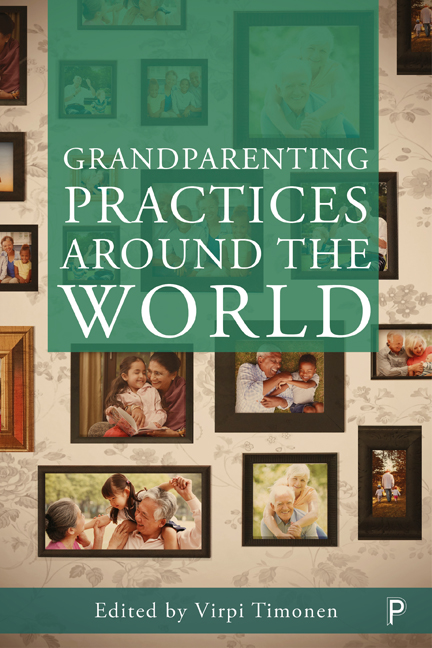Book contents
- Frontmatter
- Contents
- List of figures and tables
- List of abbreviations
- Notes on contributors
- one Introduction: widening the lens on grandparenting
- PART 1 The demographic and welfare-state contexts of grandparenting
- PART 2 Grandparenting in contexts of economic and societal development
- PART 3 Transnational grandparenting
- PART 4 Gender, intersectionalities and grandparenting
- PART 5 Grandparental roles, agency and influence
- Index
six - Transnational grandparenting: the intersection of transnationalism and translocality
Published online by Cambridge University Press: 22 April 2022
- Frontmatter
- Contents
- List of figures and tables
- List of abbreviations
- Notes on contributors
- one Introduction: widening the lens on grandparenting
- PART 1 The demographic and welfare-state contexts of grandparenting
- PART 2 Grandparenting in contexts of economic and societal development
- PART 3 Transnational grandparenting
- PART 4 Gender, intersectionalities and grandparenting
- PART 5 Grandparental roles, agency and influence
- Index
Summary
Introduction
In the past decade the phenomenon of transnational grandparenting has received increasing, yet still sporadic, academic attention. The literature shows that the term was coined to describe various forms of new and changing relationships between grandparents and grandchildren in the context of transnationally dispersed families. Despite geographical distance, grandparental relationships can be maintained through, for example, global communications (such as the internet and mobile phones), exchanging gifts, visits and childcare (Chen and Lewis, 2016; Da, 2003; Lie, 2010; Nesteruk and Marks, 2009; Sigad and Eisikovits, 2013; Stephen, 2013; Zhou, 2012).
Transnational grandparenting has been largely examined through a cultural lens. Empirical studies have primarily focused on diaspora families and minority ethnic groups whose cultural values may differ from those of the mainstream society: Chinese immigrants in Australia and the UK (Da, 2003; Lie, 2010); Indian grandparents in Canada (Stephen, 2013); Bangladeshi households in the UK (Lie, 2010); American–Israeli grandparents and their children and grandchildren who live transnational lifestyles (Sigad and Eisikovits, 2013); and Eastern European immigrants in the US (Nesteruk and Marks, 2009). On a conceptual level, furthermore, these groups’ cultural norms around, for example, family values, intergenerational relationships and the desired roles of grandparents have been fundamental in explaining those transnational intergenerational families’ struggles, negotiations and adaptations in the changing context of grandparenthood.
Ascribing to culture a central role in conceptualising transnational grandparenting, however, neglects the broader structural factors (for example, neoliberal childcare and immigration policies) with which culture intersects. Although the cultures of migrant families have buffered or absorbed the effects of international mobility on ‘minority ethnic communities’ needs’ (Lie, 2010, p 1425), various cultural institutions around grandparenting – not only grandparental roles or relationships but also expectations about ageing – may also evolve or be transformed in the process (Zhou, 2012). Using the case of transnational childcare by Chinese grandparents in Canada, I contend that an exploration of the intersection of transnationalism and translocality can contribute to a broader, contextualised perspective from which to understand the dynamics, dissonance and effects of transnational grandparenting.
The intersection of transnationalism and translocality: towards a broader conceptual framework
My analytical approach to transnational grandparenting aims to illustrate the connections between mobility and locality by drawing on theories of transnationalism and translocality.
- Type
- Chapter
- Information
- Grandparenting Practices around the World , pp. 113 - 130Publisher: Bristol University PressPrint publication year: 2018



